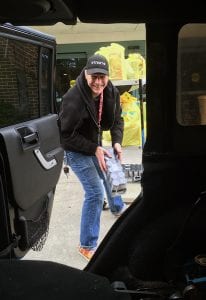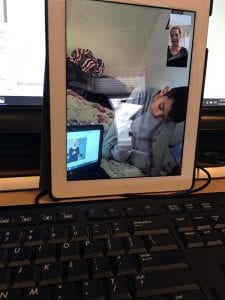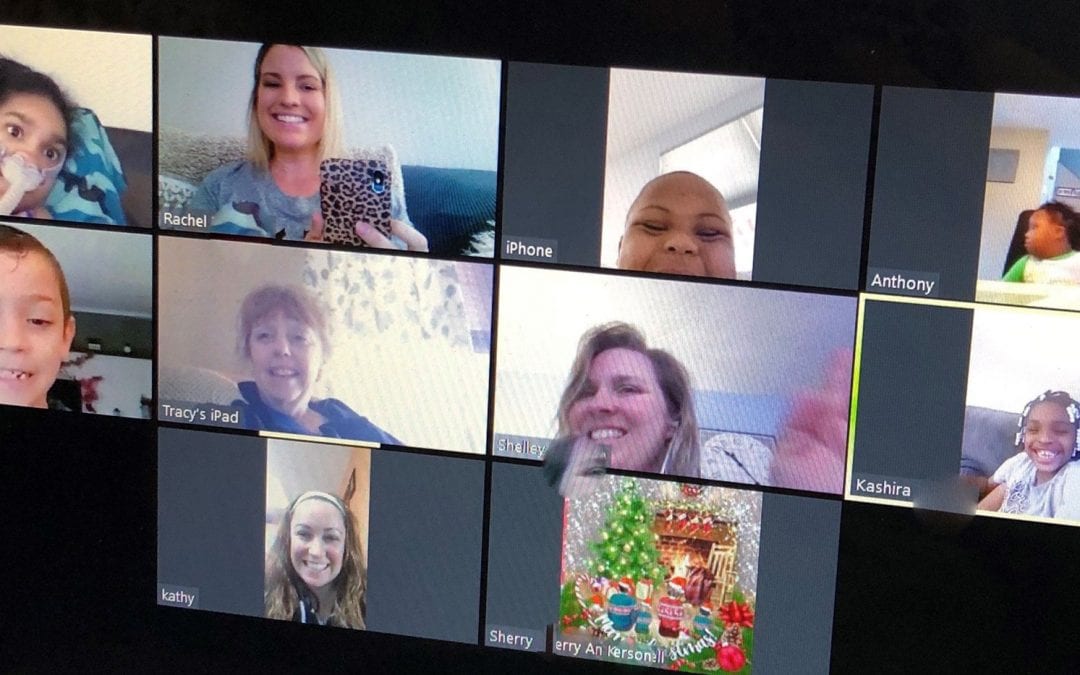Students and staff of Burlington County Special Services School District meet virtually for Ms. Reinicker’s class.
Faced with the COVID-19 health crisis, the state’s county special services school districts rose to the challenge of maintaining services to students with significant disabilities. After school leaders ironed out the procedural details of transitioning from in-class to remote instruction, things got personal for students, families and staff.
“Everyone has come together to continue putting our students and their families first,” said Jamie Moscony, assistant superintendent at Cape May County Special Services School District.
“Staff members have shared resources and new ideas on how to engage our students remotely, and many have spent their own time volunteering to work in our school-based food bank to help ensure that our families have enough food during school closure. In addition, our staff have looked after our students’ plants in their raised bed gardens and greenhouse and also have volunteered to make masks for local healthcare workers. We’ve had families and community organizations offering to help where they can as well.”

Mike McCourt, technology coordinator for Cape May County Special Services School District, helps deliver food to families in the district while the physical school buildings remain closed.
Thinking Outside of the Box
According to Moscony, the COVID-19 pandemic may have required all of the state’s schools to close their doors, but thanks to the deeply committed staff at county special services schools, students with special needs continue to learn and grow at home.“I think we are witnessing innovation at its best,” she added. “In a special services school district, each student has an Individualized Education Program, so our teachers have risen to the challenge to think outside of the box to continuously engage each student and support his or her family by making instructions easy to understand and follow. Our teachers are part of groups that draw experts from across the country to share resources and ideas for every unique challenge presented by this new mode of instruction.”
Making the Most of Online Resources
Many teachers at county special services schools had previously incorporated assistive technology in the classroom to support student learning, and so they continue to rely on that technology, while introducing some new online resources. Many are the same platforms and sites used by K-12 schools throughout the state. For example, in Bergen County Special Services School District’s Visions Program for students with multiple disabilities, all three levels of the program – elementary, middle and high school – use Google Classroom to present work to students. Teachers have introduced more and more online resources to support their instruction like Learning A-Z, Brain Pop, IXL Math, Newsela and virtual field trips to popular museums.
“Our teachers and teacher assistants also have initiated virtual meetings to present full reading/language arts, math, science and social studies lessons to all students, on a daily basis,” said Tara Bohan, director of instruction at Bergen County Special Services School District. “Students have continued to move along in their curriculum, and IEP goals and objectives continue to be addressed. Quizlet is providing the opportunity for weekly assessments.”

A student from Gloucester County Special Services School District makes the best of at-home learning by practicing math outdoors.
Remaining Connected
The staff at county special services schools also are using technology to deliver some feel-good content to remain connected with and help boost the moods of students, and also their families. At Burlington County Special Services School District, staff members have recorded themselves reading books to students. At Gloucester County Special Services School District’s Bankbridge Elementary, teacher Melanie Shields has created a series of dance warm-up videos with her children that also incorporate sign language. It’s an inclusive, fun and healthy activity for all of the school’s students and their families. A Bergen County case manager created a “wellness room” in Google Classroom with yoga and mindfulness activities.
“Those who work in our special services school districts do so because it is more than a job for them, it is their calling,” said Dr. Howard Lerner, superintendent of Bergen County Special Services School District and chairman of the New Jersey Joint Council of County Special Services School Districts. “District-wide, in all of our eight county special services school districts, staff members are truly invested in the success of each student. That has not changed just because we have moved learning offsite.”

Technology allows learning to continue for students who are deaf or hard of hearing from Bergen County Special Services School District’s Union Street School.
Providing Related Services
Lerner said that counselors, therapists and others who provide specialized services to students with special needs also have adapted to at-home learning with video conferencing, daily calls to students and families and making or sharing helpful videos for at-home modeling. New Jersey recently moved to allow districts to provide related services, such as physical therapy, occupational therapy, speech and counseling through electronic communications during an extended public health-related school closure.
“Therapists have been part of our video sessions, and they continue to provide families with ongoing strategies and activities for the students,” said Bergen County’s Bohan. Dr. Christopher Nagy, superintendent of Burlington County Special Services School District, said that the strong partnerships formed between district staff and families have paved the way for many at-home success stories. He pointed to one story from the district’s preschool program, in which staff worked together to integrate classroom goals with occupational, physical and speech therapies.
“In a case like this, the remote home instruction permitted the student to work on her fine motor skills, standing tolerance, self-help, color, shape and body part identification through various activities designed by our staff. The student’s mom then shared pictures of her daughter engaged in these exercises, allowing staff the opportunity to observe and then provide feedback to the mother how to fine-tune activities to further at-home progress,” Nagy explained.
As school closures continue at least through mid-May or possibly longer, the leaders of New Jersey’s county special services school districts expect their staff to not only continue that out-of-the-box thinking that has helped make at-home learning work thus far, but as Nagy puts it, “go where there is no box and create new and innovative pathways and solutions.”

